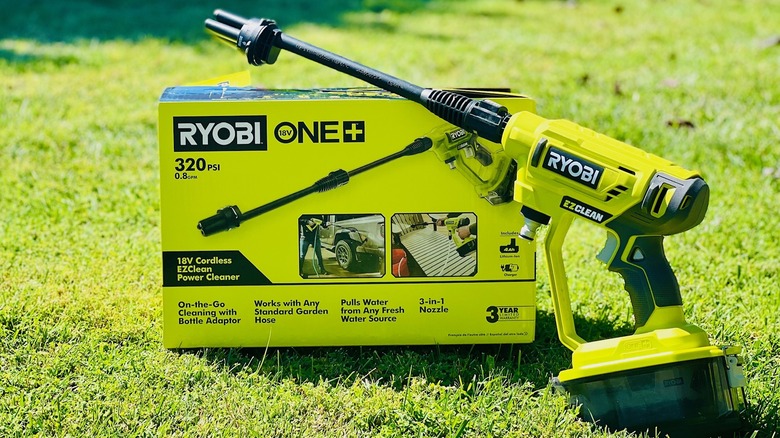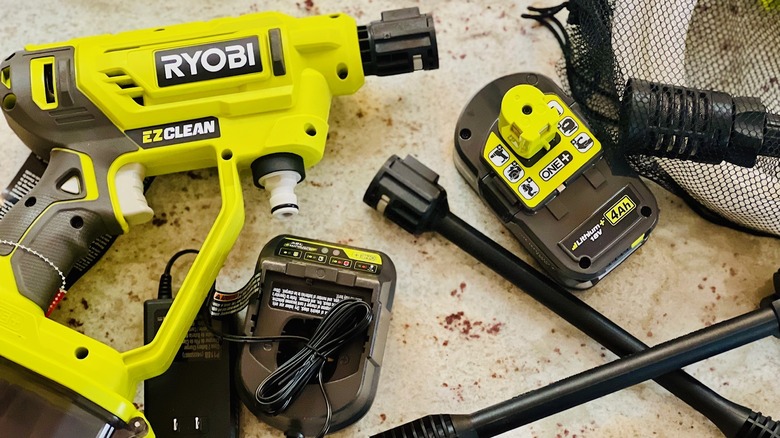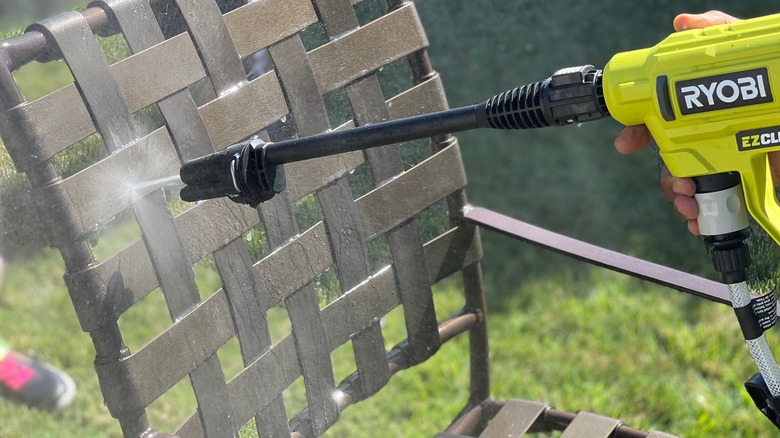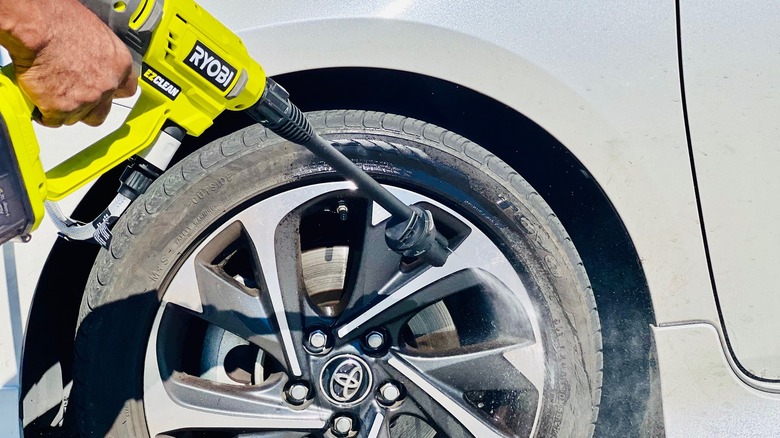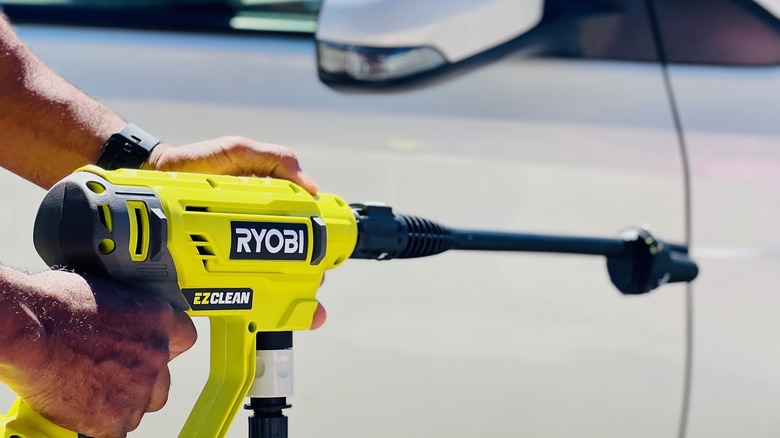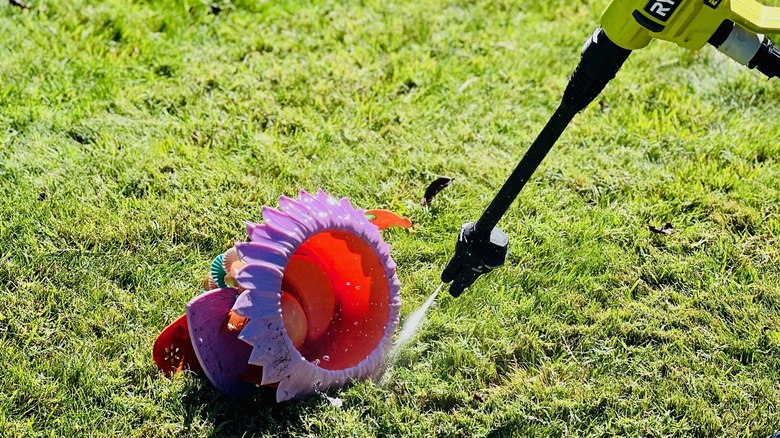We Tried The Cheapest Power Washer At Home Depot. Here's How It Went
A power washer may not initially be on your list as an essential household item, but once you use it you'll wonder what you did without it. You'll be amazed at what this nifty maintenance tool can do on a home exterior, car wheels, deck, and windows, among other things. Additionally, whether or not you should power wash depends on the climate, pollution, and conditions in your area (via Home Inspection Insider); you should also consider it if you've recently worked on large home improvement projects that kicked up dust or live on a busy street.
Spoiler alert: It's all dirtier than you think.
To that end, we went to our local Home Depot to find out if the cheapest power washer can rise to the occasion or if you simply wind up getting what you pay for. As we walked around the store to the power washer section, we noticed that there was a choice between gas and electric models depending on the job that needed to be done. An electric model is good for small tasks, and the upkeep and storage are accessible. Since we are not professionals, but rather homeowners looking for a power washer to do basic upkeep, we went with an electric model. The cheapest one we found was the Ryobi Cordless Cold Water Power Cleaner for $99 on sale, so we purchased it and got it ready to test.
Ryobi overview
Pressure washers can vary on price, ranging from $100 to $600 or more. With a price of around $100, we were really hoping that this Ryobi Water Power Cleaner would help in cleaning our front driveway, car tires, and anything else that could use a little shower. The contents included several attachments, such as a tube that connects to a bottle for soap and a 20-foot siphon hose to pull fresh water when in use. The main nozzle also had three sprayer modes, including turbo, 15, and rinse for added versatility when cleaning.
According to the label, the power washer works for windows, outdoor furniture, and even boats. The Home Depot reviews gave it a solid 3.5 stars (out of five), with the main complaint being that the plastic nozzle head that connects to the hose easily breaks. Customers did, however, praise the battery life, which is a huge plus when working on a big project outside.
How we tested the pressure washer
We decided to test the power washer outside on a variety of different items and surfaces in order to see where it performed best. Once out on the front lawn, we sprayed the front doorstep, patio chairs, kid's toys, and vehicle wheels. We were hoping that using the product on these outdoor materials would give us a good look into what it could and could not handle.
Some pressure washers are not to be used on cars and even pavers, as they are so powerful that they can cause damage. According to Propel Pressure Cleaning, additional things that should not be cleaned with a pressure washer include asphalt shingles and gutters as they can damage the shingles and fascia, leaving you with a bigger mess than you intended. We kept this in mind to be on the safe side; even though the Ryobi isn't marketed as a heavy-duty, super-powerful pressure cleaner, we didn't want to take any chances and damage anything by accident.
Did it exceed expectations?
We knew picking the lowest-priced pressure washer may result in a less than ideal outcome, but we were still hopeful that it would do the job as advertised. Per the Ryobi website, the 3-in-1 nozzle is versatile enough to clear debris while also being gentle enough for light cleaning by dialing back the pressure. We found that to be true and were surprised by how well we were able to wash the tires on our car while simultaneously doing a light watering of the plants on our front porch.
When washing the front doorstep, there was no noticeable damage, and surface dirt and even rust cleared easily. Additionally, the Ryobi did a great job cleaning kids toys that had been sitting out in the sun with no issues. We also appreciated the optional use of a bottle and a hose to attach it so we could clean the windows with soap. The water output was consistent, the nozzle did not break or come loose, and overall the product handled well and was easy to use.
We did not see any signs of the battery running low after testing it with varying degrees of water pressure. For a task that required about 45 minutes to complete, we were confident that the battery would last — and it did. We also appreciated the thoughtfulness of putting the battery in an enclosed container on the product to keep things safe and dry.
How it could be improved
Even understanding that this particular power washer was on the cheaper side, we were really hoping the pressure and cleaning would be better. We expected a strong stream of water, but found it challenging to remove some dirt and debris that had been on the surface for some time, even with the pressure turned up. While it did remove rust and caked-on dirt from car tire caps, we found that we had to actually scrub the area a bit in order for the pressure washer to fully do its job. That extra bit of elbow grease wasn't something we expected we'd have to apply as we were hoping the Ryobi could blast detritus off on its own — which according to Pressure Washers Direct, is a common downfall of an electric washer versus a gas model. Also, anything that was stained or that had been there for a while, like old paint stains on the front doorstep and dirt on the patio chairs, were tough to clean, even when we switched to turbo mode and targeted that area with the sprayer.
Another feature we did not like was the plastic nozzle that connects to the hose. When we tested the product it did not break or crack (as mentioned in the Home Depot reviews that did have the piece break), but we could see how that could happen. A more durable material like metal would be much better for the longevity of the product.
The final verdict
Overall, the Ryobi Cordless Cold Water Cleaner performed as expected for an affordable, lower-cost pressure washer. While we did not expect a heavy-duty machine, we hoped it would provide more noticeable and easy cleaning than it did. This is a product for small, occasional tasks, and nothing we would recommend for bigger projects like washing the exterior of a home. That being said, the Ryobi works well for everyday nuisances like washing fallen and crushed fruit from fruit trees and sprucing up outdoor plastic toys like playhouses and water tables. We bet it would even work for eliminating wasp nests with the bottle attachment filled with soap.
If you want a tool that can be used occasionally to clean up messes outside and get the spiderwebs off patio furniture and kid's toys, we would recommend this product. According to Cleanup Expert, electric pressure washers are on the lower end of the pressure range, which is ideal for light projects like these for the everyday homeowner. However, if you're looking for a pressure washer with more consistency for regular home maintenance, we recommend buying one with a little more power to get the job done.
